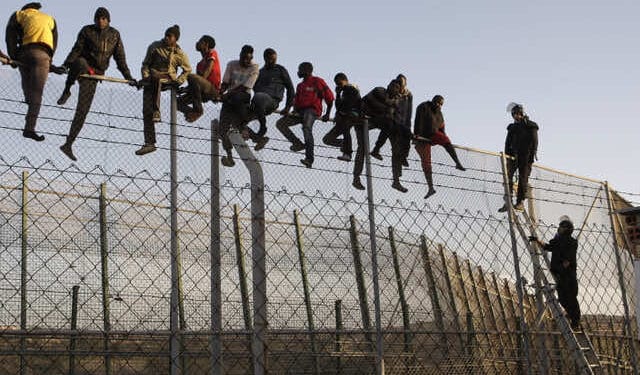Illegal migration refers to the movement of people across borders without adhering to legal protocols, driven by a myriad of factors including poverty, gender-based violence, deprivation of citizenship, and lack of educational opportunities. Those who migrate illegally often face a host of challenges, including unsafe accommodation, limited access to quality education, and inadequate healthcare. One of the significant drivers of illegal migration is the search for better employment opportunities, freedom from violence, and resolution of family issues, which compel individuals to leave their countries in pursuit of stability and security.
According to the United Nations, illegal migration is a pressing global issue, with irregular migration posing severe challenges for countries like Pakistan. Key issues linked to illegal migration include human smuggling, sexual exploitation, and human rights violations. These alarming trends necessitate urgent attention to safeguard citizens, especially children, and mitigate the risks associated with irregular migration. The United Nations (UN) must play a critical role in supporting nations to develop robust strategies to combat illegal migration effectively.
The Role of Curriculum in Preventing Illegal Migration
Education can serve as a powerful tool in addressing illegal migration by instilling moral and social values that promote peaceful coexistence. To achieve this, a well-designed curriculum is essential. Firstly, educational institutions should introduce age-appropriate storybooks and resources that impart ethical values to children, fostering empathy and understanding. Secondly, schools must focus on areas such as parental counseling, broadening educational opportunities, and fostering cultural awareness through exchange programs. These efforts can help bridge generational gaps and equip young minds with the skills to navigate societal challenges.
Also Read: Migration of Health Workers is Sickening Africa’s Healthcare System that is Chronically Underfunded
Parental engagement is pivotal in this context. Parents must remain vigilant about their children’s exposure to inappropriate content online and monitor the kind of friendships they form. Additionally, they should emphasize storytelling and value-based learning at home to nurture a positive mindset. A strong moral framework, combined with quality education, can empower children to contribute constructively to society and deter them from resorting to desperate measures like illegal migration.
Parental Counseling in the Digital Age
In the 21st century, children and young adults have unparalleled access to technology, which, while beneficial, can expose them to harmful content. Parental counseling plays a crucial role in ensuring that children use technology responsibly. Parents should monitor the type of media their children consume and provide guidance on ethical use of digital resources. Simultaneously, they must prioritize their children’s education to equip them with the knowledge and skills needed to succeed in a competitive world.
In Pakistan, Islamic values form the cornerstone of moral education, yet generational gaps persist, particularly in the context of rapid technological advancement. Parents should actively engage in their children’s lives, remaining watchful of their behaviors, friendships, and social influences. By doing so, they can help shape a generation that upholds ethical values while adapting to modern challenges.
Safe Migration through Educational Exchange Programs
While illegal migration poses significant risks, structured and legitimate migration opportunities can offer immense benefits. For instance, educational exchange programs such as the Kennedy-Lugar Youth Exchange Program allow students to travel to the United States for academic and cultural enrichment. Through these programs, students act as youth ambassadors, promoting mutual understanding between their home and host countries.
Also Read: South Sudan Standoff as Kenyan Truck Drivers Refuse Entry
Participants live with host families, attend schools, and engage in leadership and team-building activities, gaining valuable cross-cultural exposure. Such initiatives demonstrate how educational collaborations between nations can facilitate safe and meaningful migration, while fostering global citizenship and understanding. These programs underscore the importance of clearly defined migration policies that prioritize safety, education, and mutual benefit.
The Role of Policy and Curriculum in Addressing Illegal Migration
Effective policy reform is crucial for addressing illegal migration and ensuring that individuals have access to safe and purposeful migration pathways. Governments must prioritize the development of comprehensive migration policies that clearly communicate the legal steps and purposes for migration, whether for business, education, or family reunification.
Curriculum design also plays a vital role in preventing illegal migration by equipping students with the knowledge and values needed to make informed decisions. From primary schools to universities, educational institutions should implement programs that highlight the dangers of illegal migration and emphasize the importance of ethical and lawful behavior. Additionally, collaboration with organizations like the International Organization for Migration (IOM) can provide valuable insights into designing educational content that addresses the root causes of migration and offers practical solutions.
The Way Forward
Illegal migration is a multifaceted issue that demands a holistic approach combining education, parental engagement, and policy reform. By fostering a values-based curriculum, encouraging responsible parenting, and promoting safe migration opportunities, we can address the root causes of illegal migration. Governments, with the support of international organizations like the UN, must work towards creating policies that protect vulnerable populations while providing legitimate avenues for migration. Through these collective efforts, we can contribute to a more equitable and secure global society.
Follow our WhatsApp Channel and join our WhatsApp Group for real-time news updates.
This article was written by Dr. Kiran Hashmi, who works as Head of Education Department, Institute of Business Management, Karachi, Pakistan and can be reached at [email protected]










































































